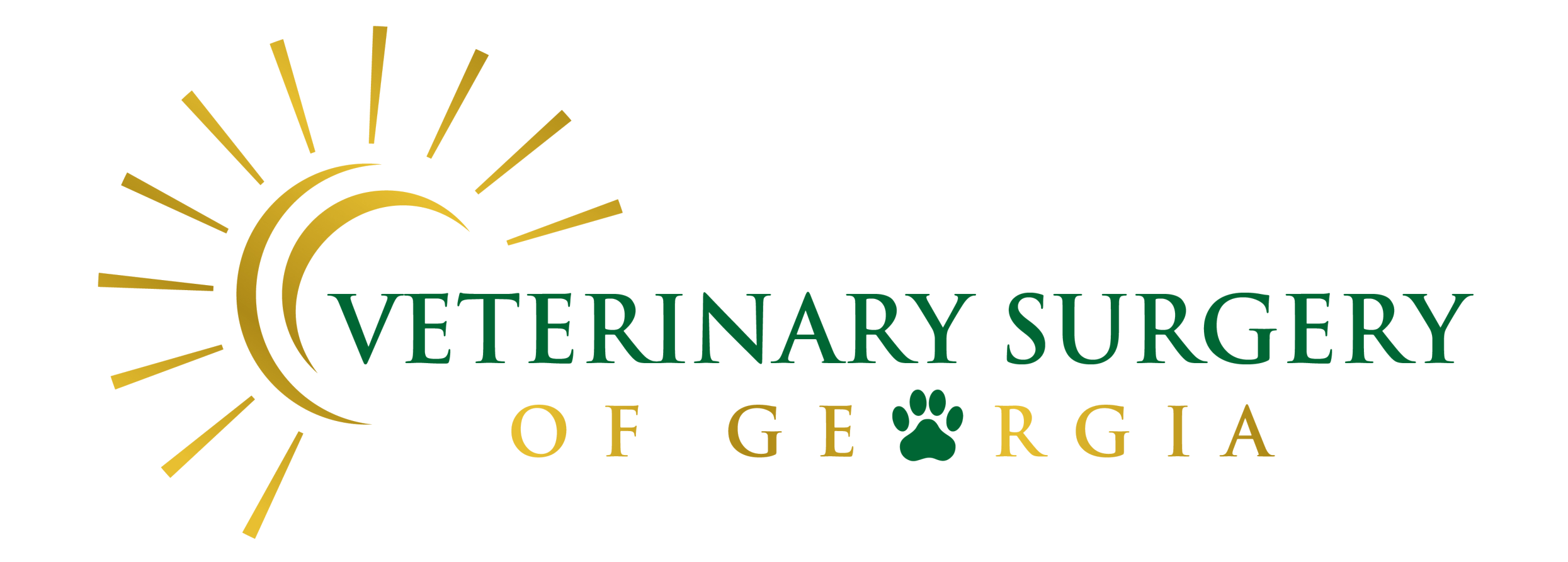Information for the Primary Veterinarian
Submit a Case
Contact Us
Procedure Fees
Please fill out your VET License Number to view the Pricing Page
Dr Lockwood has been such an asset for our location. We can now offer orthopedics for our wonderful clients. Dr. Lockwood and her team are always on time and ready to go. They communicate very well with our owners during consults and check in with them after each procedure.
We have been missing this type of service and Dr Lockwood has fulfilled that need.
Elena Tassan Hutchinson
Hospital Manager, Peachtree Corners Animal Clinic
Veterinary Surgery of Georgia Pre-Surgery

How To Schedule Surgery
- Complete a case submission form. At the bottom of the form, you can suggest particular days or weeks that work for you and your client. After I receive that information, I will contact you to confirm a date.
- Radiographs should be submitted to lockwood@vetsurgeryofgeorgia.com
- Once I have the above information, I will email you with a confirmation that includes:
- Tasks to be completed prior to our arrival on the surgery day (IV catheter placement, drug calculations and preparation)
- A surgery consent form that will need to be completed by the owner on the day of surgery.
Equipment and Medications
Veterinary Surgery of Georgia (VSG) will provide all surgical equipment, Nocita, and Lick sleeve in applicable cases. The host clinic will provide any necessary preoperative diagnostics, anesthesia equipment, operating room, radiography, anesthetic drugs, IV fluids, and monitoring equipment.
A technician/assistant should be assigned to assist us. Most single procedure cases take 2 hours from our arrival to departure.
The recommended anesthesia protocol includes:
- Opioid for analgesia (full mu preferred).
- Benzodiazepine: midazolam or diazepam.
- Propofol or alfaxalone for induction.
- Cefazolin (22 mg/kg IV over 3-5 minutes) to be given just after induction.
- IV fluids at 5-10 ml/kg/hr. Please notify VSG of any heart disease.
Day of Surgery
On the day of surgery, the patient should be presented to your hospital at your normal drop-off time for surgical patients with normal fasting orders.
- Medications (excluding NSAIDs) can be given normally in a small treat that morning.
- Trazodone administration the morning of surgery either prior to or after drop-off is recommended (> 5 mg/kg).
- Please avoid using acepromazine prior to surgery.
For morning surgeries, we will
typically arrive around 9 AM. Please notify me if this does not allow you ample time to prepare the patient and facilities.
Veterinary Surgery of Georgia Post-Surgery
Post-Operative Medications to go Home
Recommended medications to go home:
- NSAID (if appropriate based on bloodwork, and not receiving steroids)
- Gabapentin or tramadol
- Trazodone (4-8 mg/kg q 6-12 hours as needed to assist with activity restriction throughout the patient’s recuperation)
- Cephalosporin antibiotic for 10 days post-operatively
Please let Veterinary Surgery of Georgia know if you have any questions about anesthetic protocol or post-operative medications.
Radiography
Please email me available radiographs when you submit the case. Pre-operative radiographs can be taken under pre-medication or anesthesia the day of surgery if the diagnosis is clear on exam. Post-operative radiographs will be taken in every case involving metal implants (TPLO, fracture, most patella stabilization surgeries). A gurney or stretcher may be needed for transportation between the OR and radiology. It is ideal if clinic staff (with associated radiation badges) can perform the radiography.
Rehabilitation
Rehabilitation is encouraged unless otherwise specified and detailed instructions and resources are available on the website.
Client Communication
I will call the client prior to surgery after I have examined the patient. If the client would prefer a call prior to the day of surgery, please let me know. I will also call the client post-operatively and have a discharge sheet prepared to go home with the patient.
Patient Discharge
Patients can typically be discharged 2 to 5 hours following surgery. This is dependent on when the patient is alert enough to walk out of the clinic and can be affected by the anesthesia drugs used. I provide Nocita for all patients, so repeated opioid doses following surgery are not typically indicated.
I will discuss at home care with the client either before or after surgery, but it is important for the discharging staff member to review the discharge information as well. A staff member will need to review use of the www.licksleeve.com as this is a common source of questions. A hard cone/e-collar should also be sent home as this is the best way to prevent self-trauma.
Orthopedic Activity Restriction
For TPLO, patella luxation surgery, and fracture repairs, activity restriction is required for 6 weeks in most cases. In some cases, recheck radiographs are recommended before the patient returns to normal activity.
Follow Up
A recheck is scheduled with your clinic 2 weeks post-operatively for suture removal. At that time, you or the client can email, text or call me with an update if there are concerns.
Consultation Fees/Cancellation Policy
Veterinary Surgery of Georgia Consultation and Fees
An in-person consultation prior to surgery can be scheduled if desired by the client or veterinarian. The cost for this is $180. This can be scheduled with surgery to follow if indicated by exam.
Your hospital will bill the client, and you will receive an invoice from me after the surgery or consultation is completed. Payment can be made by check or ACH. Payment is due on receipt of the invoice and 1.5% interest will be added on any outstanding balance exceeding 30 days until paid.
Additional Information
For cancellations of surgery or consultation with less than 24 hours’ notice, there will be a charge of $180. For no-shows, there will be a $300 charge.
VSG offers a 25% discount to employee pets and 501(c)(3) rescue organizations.
Please feel free to contact me with any questions or concerns.
